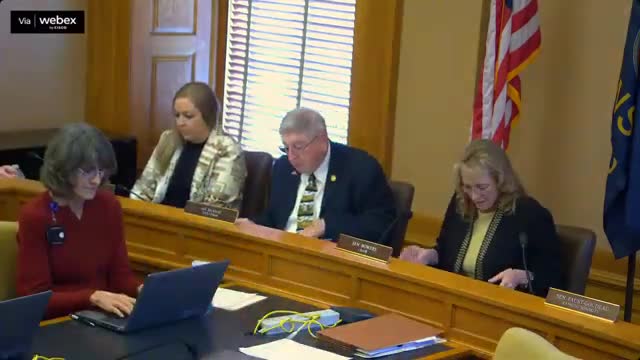Committee hears bill to require closure of dormant campaign accounts within 90 days after second subsequent general election
Get AI-powered insights, summaries, and transcripts
Subscribe
Summary
A Kansas Senate committee on [date not specified] heard testimony on Senate Bill 40, introduced by Senator Schellenberger, that would require state and local campaign accounts to be terminated within 90 days after the date of the second subsequent general election in which the person was not elected and to disperse remaining funds to charity, the party, or contributor refunds.
A Kansas Senate committee on [date not specified] heard testimony on Senate Bill 40, introduced by Senator Schellenberger, that would require state and local campaign accounts to be terminated within 90 days after the date of the second subsequent general election in which the person was not elected and to disperse remaining funds to a charitable organization, a party, or as refunds to contributors. The bill cites an existing statute on the permissible dispersal of campaign finances (referred to in testimony as “KSA 20 five-forty one-fifty 7 A”) and would take effect on July 1, 2025 if enacted.
The measure was presented in briefing remarks by Charles (staff member), and supported by testimony from Caitlin Bull Stewart, General Counsel for the Kansas campaign finance commission, and Rob Filian of RFK Consulting LLC. Caitlin Bull Stewart said, "The commission had supported the ideology behind this of requiring the termination of campaign accounts in its annual report in both 2023 and 2024," and described longstanding compliance and tracking problems caused by accounts that remain open for many years. Rob Filian told the committee he supported the bill as a donor, saying, "I don't wanna pay for your cell phone bill for the rest of your lives."
Committee discussion centered on three practical questions: whether current law already restricts spending from dormant accounts; how the Kansas commission would enforce the new requirement; and special situations such as accounts of deceased candidates and the portability of campaign funds when candidates pivot to different offices.
On legal and enforcement issues, Caitlin Bull Stewart told the panel that campaign finance rules limit what contributions can be spent on and that enforcement of termination would fall under the commission's jurisdiction. She said the bill as written would not add criminal penalties; rather, the commission would require compliance. She also noted the bill’s current language could be clarified so the termination timing is easier to follow.
Committee members pressed for implementation details. Senator Patty asked whether mileage reimbursements and other routine expenses would still be permitted during the period a campaign account remains open; the panel was told by witness testimony that current law already limits expenditures to legitimate campaign purposes and that continued payments while a person is not a candidate may not be legal, though the commission has had trouble tracking older accounts. Senator Reichman asked for an estimate of the total funds sitting in long‑dormant accounts; Caitlin Bull Stewart said she would follow up to provide account totals by email to the committee.
Witnesses and the sponsor cited examples of large accounts remaining open for long periods. In committee remarks, Senator Schellenberger cited two accounts that stood out in a preliminary review: he said "President Weigel" had an account with "over $200,000" and that former Senator Garrett Love had "over a hundred thousand dollars" in an account. Caitlin Bull Stewart told the committee the commission had identified more than 20 accounts inactive for 10 years or more and a small number inactive for decades.
Members discussed alternatives and clarifying language. The commission’s prior legislative recommendation included an option to deem accounts inactive after six years; Caitlin Bull Stewart described six years as a “generous” threshold. Senator Titus suggested clarifying statutory language to address deaths in office or other exceptional circumstances so the termination requirement would not inadvertently apply when inappropriate; witnesses indicated the commission typically exercises discretion and would work with filers and their representatives in exceptional cases, and that problems closing an account after a candidate’s death are often tied to bank and probate processes rather than the Campaign Finance Act itself.
No vote was taken; the committee closed the hearing on Senate Bill 40 after proponents’ testimony and written submissions were noted. Staff agreed to follow up with the committee by email with account totals and additional clarifications requested during the hearing.
Ending: The committee has not scheduled a vote on Senate Bill 40. If the committee advances the bill, members indicated they may seek clearer statutory language on enforcement, timing and exceptions. Supporters said the change would simplify compliance and align account balances with donors’ intended purposes, while committee members sought more detail on enforcement and edge cases before proceeding.
